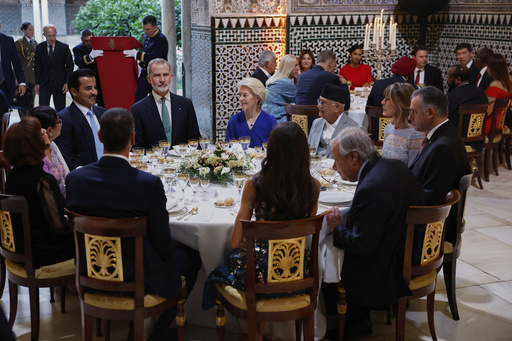In Spain, representatives from numerous countries congregated on Monday to address the expanding disparity between affluent and impoverished nations, striving to secure the trillions of dollars required to narrow this gap. Although the U.S. was notably absent, more than seventy world leaders and delegates present endorsed the Seville Commitment, named after the host city, without any modifications. This agreement highlights the delegates’ consensus to launch “an ambitious package of reforms and actions to close the financing gap with urgency.”
The gathering unfolded amid countries grappling with escalating debt, dwindling investments, reduced international assistance, and increasing trade barriers. Nevertheless, there is optimism that globally, access to essential services such as food, healthcare, education, and water can be improved. United Nations Secretary-General Antonio Guterres underscored the importance of financing for development by stating in his opening remarks at the four-day Financing for Development event, co-hosted by the U.N. and Spain, “Financing is the engine of development. And right now, this engine is sputtering.”
The event served as a platform to address the approximately $4 trillion annual financing gap, aiming to facilitate development, bring millions out of poverty, and meet the lagging United Nations Sustainable Development Goals set for 2030. Attendees included heads of states, representatives from international financial entities, development banks, charitable organizations, the private sector, and civil society.
Spain’s Prime Minister Pedro Sánchez emphasized the summit’s potential in raising collective voices against competition-driven narratives. At a former preparatory meeting on June 17, the United States did not endorse the outcome document, which had been under negotiation by the U.N.’s 193 member nations for months, and also announced its withdrawal from the process and the Seville conference. This decision was termed “unfortunate” by U.N. Deputy Secretary-General Amina Mohammed, but she expressed hope for future engagement with the U.S. to help alleviate global poverty.
Despite the U.S. withdrawal, both the European Union and France have resolved to maintain their commitments. French President Emmanuel Macron declared that “collective mobilization can still work.” European Commission President Ursula von der Leyen confirmed the EU’s steadfast dedication to development financing and stated, “Our commitment is here to stay.”
The Seville Commitment envisages setting a minimum tax revenue of 15% of a nation’s GDP to better government financing, tripling lending by multilateral development banks, and heightening private investments by introducing incentives for infrastructure development. It also promotes reforms to ease countries’ rising debt pressures.
As reiterated by U.N. trade chief Rebeca Grynspan, “development is going backward,” as the global debt situation continues to worsen. She noted that a staggering 3.3 billion people resided in nations paying more on debt interests than on health and education last year, with this number anticipated to escalate to 3.4 billion this year. Developing countries are on track to spend $947 billion servicing debts this year, up from $847 billion previously. Angolan President Joao Lourenco echoed these sentiments, revealing that debt payments surpass health and education spending in several countries.
Despite the U.S.’ position, during the June 17 meeting, Jonathan Shrier, acting U.S. Representative to the Economic and Social Council, reaffirmed America’s ongoing commitment to international collaboration and economic progress, though he pointed out that certain aspects of the Seville Commitment conflicted with U.S. policies. Specific areas of contention include proposed changes to the governance of financial institutions, the tripling of multilateral development bank lending capacities, and the U.N.’s role in debt frameworks.
Despite the U.S.’ previous position as the world’s largest foreign aid donor, the Trump administration’s dismantlement of the USAID and significant cuts to foreign assistance funding, branding it wasteful, have contributed to a declining trend in Western financial support.


